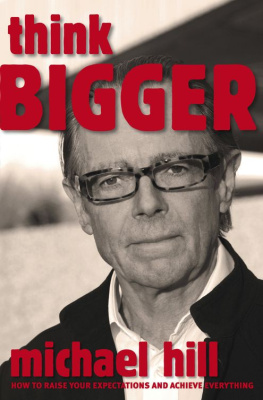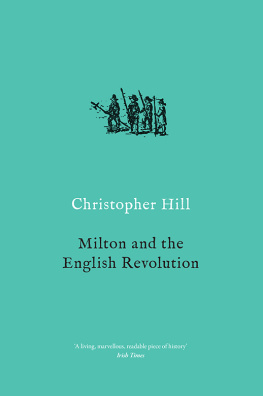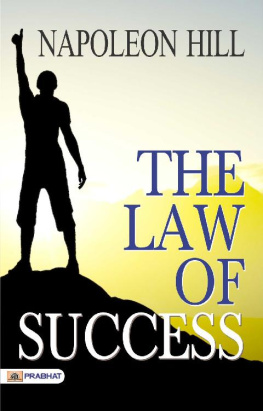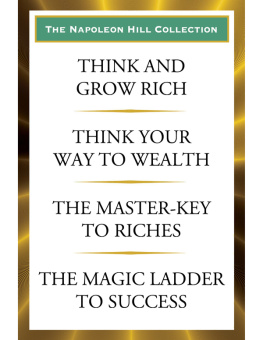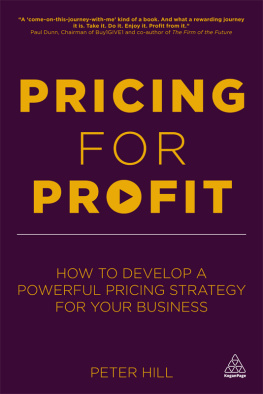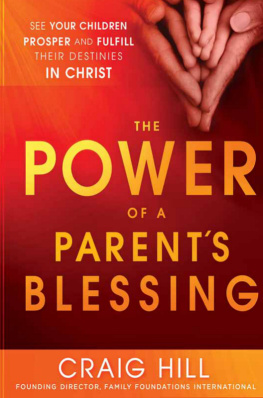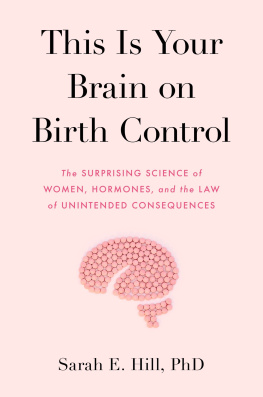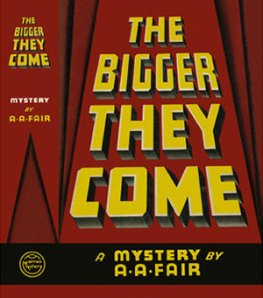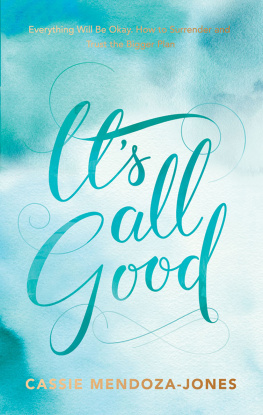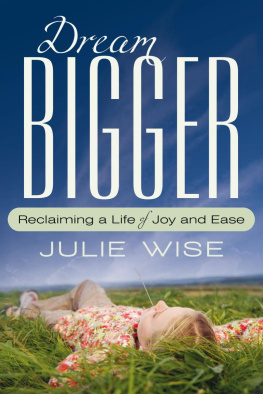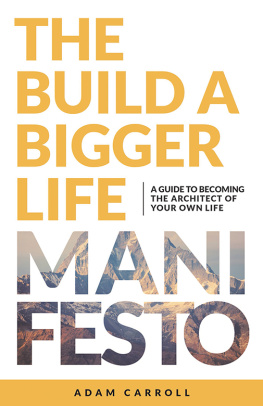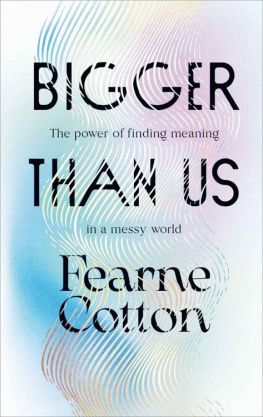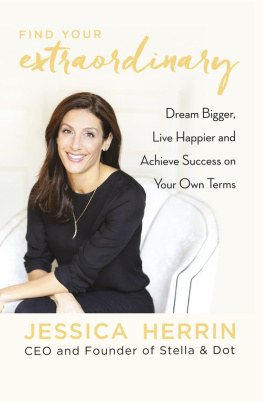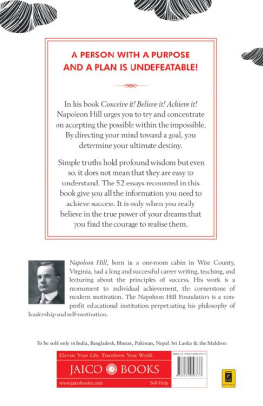Hill - Think bigger: how to raise your expectations & achieve everything
Here you can read online Hill - Think bigger: how to raise your expectations & achieve everything full text of the book (entire story) in english for free. Download pdf and epub, get meaning, cover and reviews about this ebook. City: Auckland;N.Z, year: 2010, publisher: Random House New Zealand, genre: Religion. Description of the work, (preface) as well as reviews are available. Best literature library LitArk.com created for fans of good reading and offers a wide selection of genres:
Romance novel
Science fiction
Adventure
Detective
Science
History
Home and family
Prose
Art
Politics
Computer
Non-fiction
Religion
Business
Children
Humor
Choose a favorite category and find really read worthwhile books. Enjoy immersion in the world of imagination, feel the emotions of the characters or learn something new for yourself, make an fascinating discovery.
Think bigger: how to raise your expectations & achieve everything: summary, description and annotation
We offer to read an annotation, description, summary or preface (depends on what the author of the book "Think bigger: how to raise your expectations & achieve everything" wrote himself). If you haven't found the necessary information about the book — write in the comments, we will try to find it.
Hill: author's other books
Who wrote Think bigger: how to raise your expectations & achieve everything? Find out the surname, the name of the author of the book and a list of all author's works by series.
Think bigger: how to raise your expectations & achieve everything — read online for free the complete book (whole text) full work
Below is the text of the book, divided by pages. System saving the place of the last page read, allows you to conveniently read the book "Think bigger: how to raise your expectations & achieve everything" online for free, without having to search again every time where you left off. Put a bookmark, and you can go to the page where you finished reading at any time.
Font size:
Interval:
Bookmark:
I dedicate this book to you
but only if you are about to change
to push harder and achieve what, to
others, might seem impossible.
Yes, I dedicate this book to you.

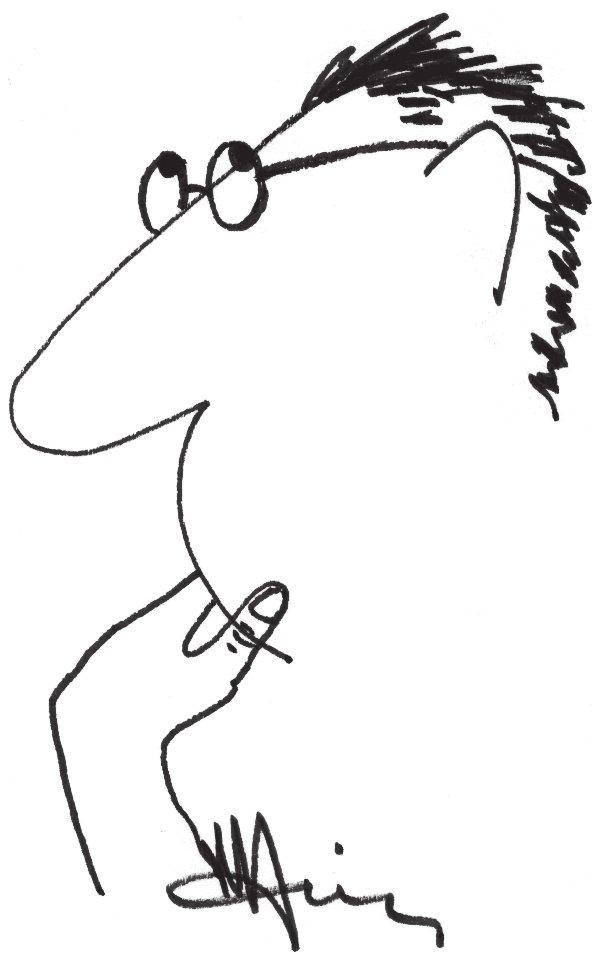
Deep down inside, do you ever get the feeling there must be a better way to live your life? That life for you is like living on a treadmill; you are in a rut and cannot see a way out, let alone any distance ahead.
I discovered a better way some of it by accident, some by my own failures and some from misfortunes that has taken me on a new path to places I never knew existed.
If you have bought this book but are not planning to change your life, please do not read any further, but give it to a friend who will make good use of it.
Still here? Good. There are just a few simple rules to help you get the most out of this book and learn to think bigger the Michael Hill way.
You will discover a different way forward and be able to look at yourself from a different perspective; see how unique you are and how much potential you really have. This will enable you to set goals, think bigger, stop worrying, be healthier and even have time to effortlessly enjoy life.
You will also discover it is not just one thing that makes the difference between success and failure, but a combination of many small things that we often overlook and, if left unattended, mar our path to our biggest potential.
The book is divided into three main sections:
Life
and Balance.
And there is a final section that sums up the philosophy of Thinking Bigger the Michael Hill way.
Why work, life and balance? Because everyone talks about work-life balance, but hardly anyone does anything about it. I want to change that. It is only by understanding the relationship between work, life and balance that you can free yourself to think bigger than you ever believed possible.
You can read these sections in any order. This book is designed to be read and reread. You might like to keep it beside you at all times. On your desk. Next to the bed. In your car. Youll find it gives you solutions, challenges and inspiration when you most need them.
And be sure to practise what you find in here. Apply the rules. Test them for yourself. Dont take my word for it. The aim is to get you ready to think bigger.
You wont get anything unless youhave the vision to imagine it.
John Lennon
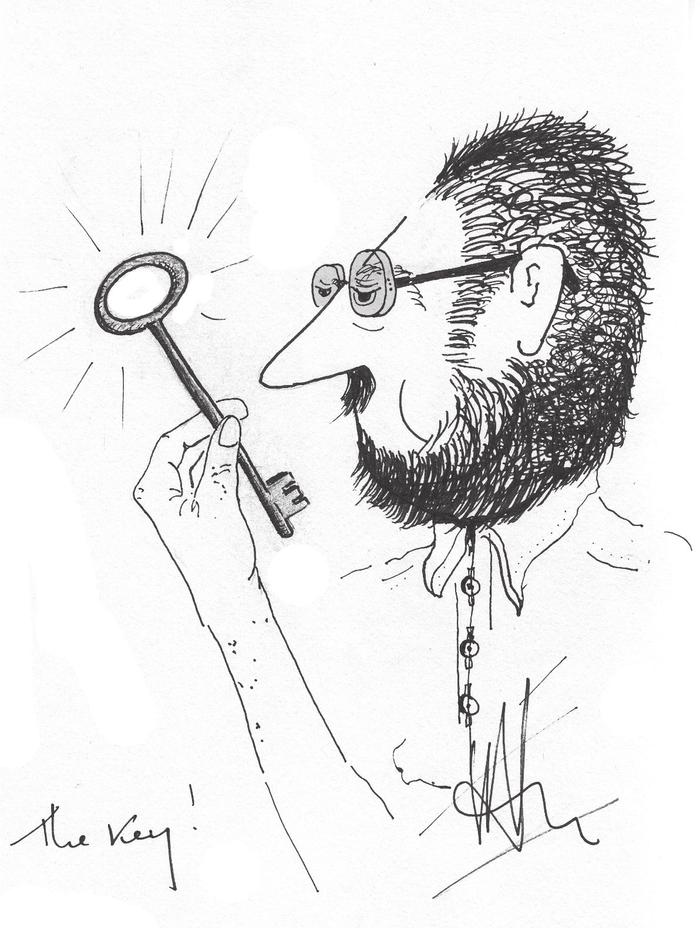
The first & most important rule for thinking bigger successfully is to set a goal and contemplate where you want to go. Where do you want to be and what do you want to be doing in 30 years time? If youve never thought about it, shut your eyes and imagine yourself three decades from now.
Let go of all the old baggage you may be carrying around; forget all the negatives that could be in your way. Forget the fear of not trusting your inner instincts. Forget your age, as how young or old you are makes no difference. Forget any weaknesses or disabilities you may have.
Now, fling yourself without any inhibitions into visualising what you want to stand for.
What do you
really, really want
What are you doing in your minds eye? What is the first thing that has popped into your head? Whatever it is, its probably correct.
By the way, you can set goals at any age. With the right attitude to health and a few simple preventive measures which we will talk about later in this book you can almost certainly count on another 30 years, even if you are past what used to be called retirement age. (Retirement is something you wont be hearing much about in this book. I dont believe in it.) In fact a goal will probably extend your life.
One of my heroes is Antonio Stradivari, the great violin maker. He lived in Cremona, Italy, from 1644 to 1737 a time when the average life expectancy was 35. He survived famines and plagues that devastated the populations around him. His goal was to create a perfect violin. His instruments are masterpieces in their own right. He was always striving to make the perfect violin. No matter how good he got, he always wanted to be better.
All his measurements and drawings have been analysed by computer and been shown to be absolutely perfect, although all he had to work with were his hand and eye. At the same time, every instrument was different because of the different woods he had to use. He could sense that one piece of wood was different from the wood he used in the last violin and would almost instinctively make minuscule adjustments to allow for that. He had a drive to achieve something and didnt want to let go of life until he had achieved it.
Antonio Stradivari died at the age of 93. He had found the key: to be able to discover in yourself what it is you really would like to do and to not doubt yourself.
Stradivari had found the key: to be able to discover in yourself what it is you reallywould like to do and to not doubt yourself.
On the other hand, there are successful people who havent worked out a 30-year goal. I can only imagine what they will achieve when they do.
One of these is the inspiring New Zealander Kevin Biggar, who has rowed the Atlantic and walked to the South Pole among other achievements. When I met him I asked him what his long-term goal was and he said he didnt have one. Hes very goal-orientated, but he didnt have that long-term vision.
But that is not unusual. Very few people think 30 years ahead. This is the key to achieving bigger things. Seeing that approximately only half a per cent of the population do think this far ahead, it gives you an enormous competitive advantage.
So, what is your vision? When you close your eyes, do you see yourself hiking in the Himalayas, working to end child poverty in your home country, collecting your BA, welcoming guests to your Michelin-starred restaurant or managing a successful Michael Hill store?
Can you imagine it? But I want you to think BIGGER.
Now, imagine yourself climbing Mt Everest, collecting a Nobel Peace Prize for ending global child poverty, collecting your PhD, opening the fifth in your chain of Michelin-starred restaurants or managing 300 stores in a foreign country for Michael Hill.
People who have a 30-year goal will achieve bigger results far quicker than they imagine.
Yet if you asked anybody on the street What are you going to be doing in 30 years?, youd get a shrug of the shoulders and a blank look in almost 100 per cent of cases. Very few people know where they are going in the long term. Result: they dont achieve their full potential. People who have a 30-year goal, on the other hand, know exactly where they are going and will probably get there far quicker than they imagine.
I break it down into three phases so its easier to handle. Every 10 years is a stepping stone for raising the bar yet again. So every 10 years your expectations and thoughts will move you closer to your long-term 30-year target.
Even Stradivari seemed to do this every 10 years of his long career. He was ripe for change every decade. Until 1690 he was still producing violins based on the excellent model of Nicol Amati, the violin maker from whom he learnt his trade. In the next 10 years he was determined to branch away and make the perfect violin. From 1690 until 1700 he began producing a long-pattern violin that was different from any that had ever been made. From 1700, for 10 years, he abandoned his long pattern totally and tentatively made the violin into a new form that was fuller in the body with a bigger and more robust sound. By 1710, at the age of 66, he was producing his grand pattern, which was the climax of his career. He worked on and tried to improve this over every decade until he died at 93.
Font size:
Interval:
Bookmark:
Similar books «Think bigger: how to raise your expectations & achieve everything»
Look at similar books to Think bigger: how to raise your expectations & achieve everything. We have selected literature similar in name and meaning in the hope of providing readers with more options to find new, interesting, not yet read works.
Discussion, reviews of the book Think bigger: how to raise your expectations & achieve everything and just readers' own opinions. Leave your comments, write what you think about the work, its meaning or the main characters. Specify what exactly you liked and what you didn't like, and why you think so.

